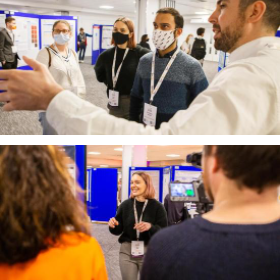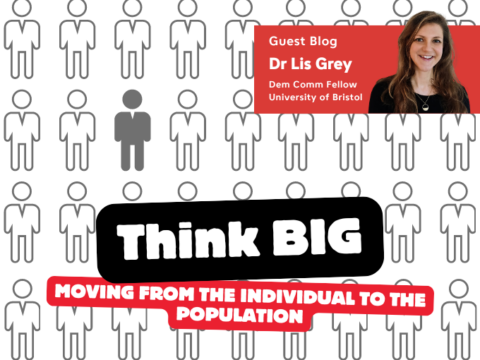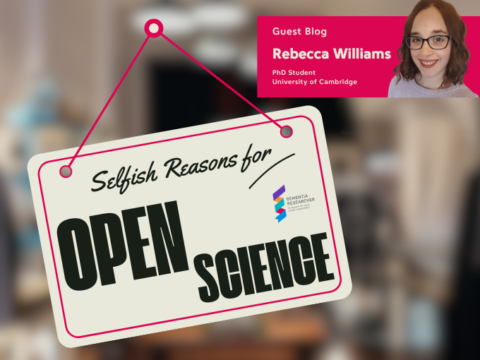When I first began my PhD, I heard the word ‘networking’ all the time, it was thrown about in all of my introductory sessions and training reports but I actually had no idea what it really was, or most importantly what it entailed. So, I thought in this blog I’d write about some of the things I’ve learned about networking and some things that may help you network during your own PhD.
I think it’s important that I start out with what networking is because let’s face it, how can we do something if we don’t know what it is. When I google networking it is defined as ‘the action or process of interacting with others to exchange information and develop professional or social contacts’. You might be thinking, well okay that’s pretty self-explanatory which I agree with but what I realised was that no one really teaches you how to network – so how do you learn how to network?
Unfortunately, I have no clear-cut answer for this however, I can tell you about are some of the things that I’ve done myself. These are obviously not the only ways to network and I’m definitely still learning how to network more effectively but so far, I think they’ve served me relatively well. So, I’d like to share with you three important things I’ve learned/have helped me to network in academia as a PhD student.
-

An example of networking in action. Here is Beth at the recent ARUK Conference where she was awarded the Laura Pulford Prize.
Use social media to your advantage
Social media is definitely not for everyone, and before my PhD I actually had no social media, I know, hard to believe seeing as now I’m quite active on there. But the only reason I am very active on Twitter and Instagram is because I use these platforms for the majority of my networking. I created an academic Twitter account in the first year of my PhD so that I could keep up with the work happening in other research labs as well as using this account to stay up to date with outreach or science communication opportunities. One thing that I did early on was not only follow labs in my field, but I also followed the PI’s of those labs. Some people may not see this as networking but I’ve found that liking posts, retweeting papers and commenting on things has been a great way to network and connect with others online. Twitter has also been great to network with other PhD students and post-doctoral researchers. Again, not everyone would feel comfortable doing this but if I saw that someone had ‘neuroscience PhD student’ or ‘Alzheimer’s disease research’ in their bio I’d give them a follow and interact with posts.
Recently I attended my first in-person national conference (the ARUK conference, which was definitely one of the highlights of PhD so far) and it was so awesome to finally meet some of the people that I’ve been following and interacting with for the past two years! Without Twitter I certainly would not have met some of those people and by using Twitter it also allowed me to start conversations with people in-person easily because I was able to use the old ‘oh we’ve been following each other on twitter….’ line.
- Ask your supervisors for tips, they may even be able to introduce you to people
One thing I was pretty amazed by was how many people my supervisors new. It was as if they knew literally everyone in the field. However, your supervisors having wide networks themselves can also be really helpful for you. Obviously, they can’t do the networking for you but hopefully, you have a relationship with them where you can ask them for some tips on networking e.g how did they network when they first started their PhD? Do they have any advice on how to approach the heads of lab groups? In addition to this, if there is a researcher that you know you want to reach out to and your supervisor knows them, they may be able to introduce you to that individual (this can be especially beneficial at conferences) as going up to PI’s at a conference can be exceptionally daunting, so if your supervisor does the initial introduction, it may help ease any anxiety and start the conversation for you and then you can impress them by how great you are!
- Attend conferences where possible
Over the past few years networking has been really difficult for PhD students, as it has been quite difficult to network through online platforms at online conferences. But now that more conferences are beginning to happen in person if there are any conferences you can attend in person I would highly recommend this – as I would say some of the best networking I’ve done throughout the past 2.5 years of my PhD was only recently done at my first in person conference. I’d heard many people say about how much they missed networking with people at conferences but as I’d never experienced a conference, I couldn’t really understand what they meant. But now, having been to my first national in-person conference I can totally see what they mean. Here are some things that I found useful during the conference:
Talking to people in the lunch queue: I know it sounds odd but having the odd chat in the lunch queue can be a great way to meet people and to ask about their work. And if I you’re super interested in hearing more, you could even ask to sit with them.
Wandering around the posters in the poster sessions and asking questions: Before the ARUK conference I had never presented a poster as a PhD student, so I didn’t really know what to expect. But, one thing that helped me present my own work was wandering around all the posters and asking people questions, as this gave me an idea of what I was actually supposed to be doing. One thing I realised, was that many people were in the same position and also had never done this before, and after we chatted about the science on many posters we also chatted about our own experiences of our PhDs – which was really great. So, the poster sessions are not just great to learn about others work but they are super helpful in meeting other researchers!
Attending the networking sessions: Usually at a conference there will be some form of networking event. I found this to be a great way of chatting about science and as a way to get to know other scientists in a more comfortable environment. So, if you have the opportunity to attend one of these events I would highly recommend.
Overall, I think one important thing to remember about networking is that there is no one size fits all, there are so many ways to network and you have to do what’s right for you! The whole concept of networking as a PhD student can be scary, but I try to remind myself that scientists are humans, however high up they are and most people are actually very nice and want to help young researchers develop their networks. Good luck with your networking!

Beth Eyre
Author
Beth Eyre is a PhD Student at The University of Sheffield, researching Neurovascular and cognitive function in preclinical models of Alzheimer’s disease. Beth has a background in psychology, where she gained her degree from the University of Leeds. Inside and outside the lab, Beth loves sharing her science and we are delighted to have her contributing as a regular blogger with Dementia Researcher, sharing her work and discussing her career.

 Print This Post
Print This Post




